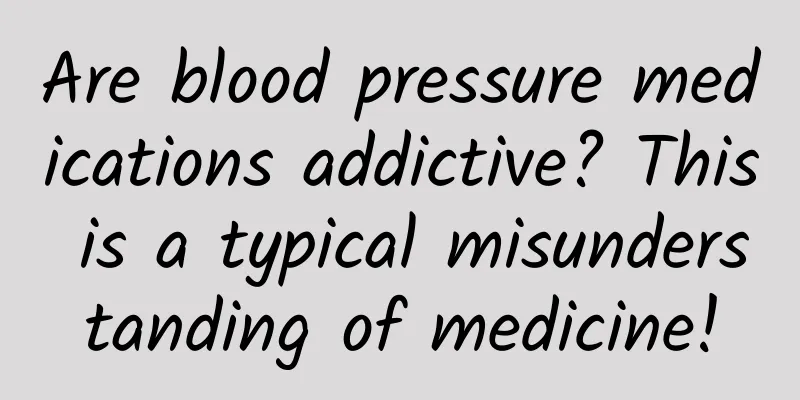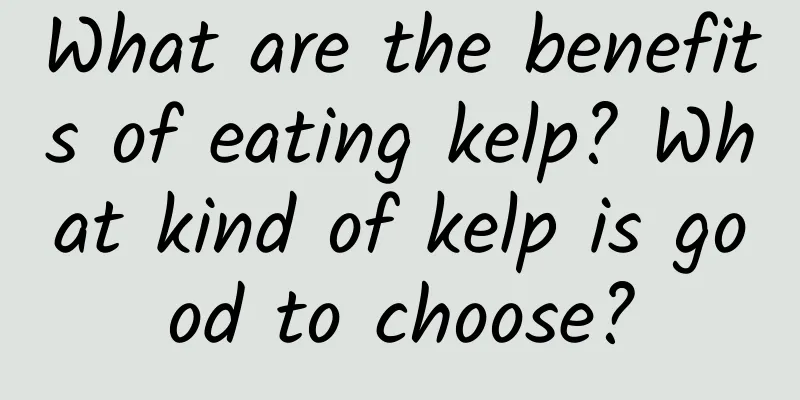Are blood pressure medications addictive? This is a typical misunderstanding of medicine!

|
Written by Xu Sijia (Kyoto University School of Medicine, Japan) In life, we have more or less heard such rumors, "antihypertensive drugs are addictive" and "once you start taking them, you can't stop." What is behind this is actually a typical misunderstanding of drug use. - Is it taking drugs that causes addiction? Or is the disease itself persistent, and you need to take drugs to protect your body's balance? This article aims to enhance the public's understanding of this issue by introducing the representative disease "hypertension." Tuchong Creative Hypertension is a chronic disease that affects the health of about 1.5 billion people worldwide. It is like a thin rope hanging the sword of Damocles, causing myocardial infarction, heart failure, stroke and other life-threatening diseases to come unexpectedly. In the middle of the 20th century, the three giants Roosevelt, Churchill, and Stalin, who had made outstanding achievements on the international political stage, all died of complications from hypertension. It was not because they lacked good medical conditions, but people at that time generally did not realize the importance of long-term blood pressure control. Even today when relevant knowledge and medical resources are very popular, many people still believe that antihypertensive drugs are toxic and addictive, and resist hypertension treatment, resulting in about 10 million people dying prematurely from hypertension each year. What kind of misunderstandings and contradictions are there? In the peaceful years, high blood pressure brings the blade of death unexpectedly. | (French) Felix Offray "The Sword of Damocles" 01 I won't be silent forever Hypertension is a silent health killer. When this silence is broken during a physical examination, many people think it is an accidental deviation. In fact, he may have lived with hypertension for many years without realizing it. Symptoms that are considered typical, such as dizziness and headache, are actually not common, which is why many patients lack a sense of reality about their illness. Just as constant mental stress is unbearable, long-term high blood pressure also overwhelms the body's important organs, such as the heart, brain, and kidneys. Complications of hypertension can cause disability and bring huge economic burdens. Stroke alone causes an economic burden of 40 billion yuan per year in my country. my country has a large population base. It is predicted that by 2030, the number of cardiovascular and cerebrovascular patients in my country will exceed 500 million, and the increasingly younger age of the patient population is also worrying. Tuchong Creative The vast majority of hypertension is spontaneous. Although heredity, obesity, smoking, high-salt diet, etc. are important contributing factors, the exact cause of hypertension remains an unsolved mystery. The human body's circulatory system is like a water pump. When blood is pumped out of the heart, the force that hits the blood vessel (artery) wall forms blood pressure. Pumping too fast and too hard, too much blood, poor blood vessel elasticity or blockage... may cause the pressure to exceed the load. Blood vessels that are subjected to high pressure for a long time will bulge outward locally, creating weak points and easily rupture. Depending on the location of the blood vessels, it may cause aortic tearing, stroke, blindness, etc. The physiological mechanism of the human body is much more complicated than a water pump, and the neuroendocrine system is also involved in the regulation of blood pressure. Therefore, blood pressure seems to be an independent indicator, but it is actually a comprehensive projection of many factors. Major organ damage caused by hypertension 02 The real role of antihypertensive drugs is not treatment, but prevention Like a train leaving the platform, once hypertension is formed, it is difficult to reverse itself without intervention, and it will continue to develop with factors such as aging and worsening arteriosclerosis. Hypertension cannot be cured. The purpose of antihypertensive treatment is not just to pursue numerical values, but to protect important organs that are under the threat of "high blood pressure" for a long time and prevent the occurrence of serious complications. Generally speaking, to effectively reduce the risk, blood pressure must be controlled below 140/90 mmHg, but this standard varies from person to person. The "Hypertension Practice Guidelines" released by the International Society of Hypertension in May this year pointed out that the best standard for people under 65 years old is 130/80 mmHg. For patients with risk factors such as abnormal blood lipids and blood sugar, and a family history of hypertension, the standard must be stricter. The elderly often have cerebral ischemia, so the blood pressure standard can be appropriately relaxed. High blood pressure is like a train that can't stop on its own | Sony Pictures Entertainment A low-salt diet and other lifestyle habits are the basis of antihypertensive treatment and can improve mild hypertension. However, when these alone are not enough to bring blood pressure to the target, medication is needed. Different types of antihypertensive drugs have different focuses: some slow down the heart rate and weaken the contraction force, making the heart pump less vigorously; some excrete excess water from the body through diuresis to reduce the overall burden; and some are good at relaxing tense blood vessels. Unfortunately, no drug can take care of every link perfectly. Strictly speaking, the success of antihypertensive treatment cannot be judged by the high or low blood pressure values in the short term. Only when the patient does not suffer from serious complications for the rest of his life can the treatment be said to be effective. If you ignore the high or low blood pressure, it will eventually lead to physical dysfunction or the need for machine-assisted living. Actively controlling blood pressure afterwards will only be a way to stop the disease, and it will be difficult for the body to return to its original state. 03 The "addiction" illusion of antihypertensive drugs The professional term for drug addiction is "drug dependence", which is a pathological compulsive behavior caused by repeated, long-term or high-dose use of a certain drug. The use of drugs is no longer out of medical needs, but to avoid the physical discomfort caused by withdrawal, and the start or end of drug use and the dosage of drugs cannot be controlled. No matter how you look at it, antihypertensive treatment is fundamentally different from drug dependence. First of all, the original cause of high blood pressure has nothing to do with antihypertensive drugs. Antihypertensive drugs are used to prevent complications of persistent hypertension, and the long-term health benefits far outweigh certain adverse reactions of the drugs. Tuchong Creative To be precise, it is blood pressure management that must be adhered to throughout life, and one cannot only see it one-sidedly as "the medicine cannot be stopped." A person's mental and physical state, seasonal changes, etc. can cause blood pressure fluctuations. For example, in summer, blood vessels dilate, and the overall blood pressure level may be lower than in winter. In this case, the doctor may recommend that patients who originally took a lower dose of medication suspend medication. However, daily monitoring of blood pressure, low-salt diet, and treatment of underlying diseases should not be relaxed. In short, everything is based on blood pressure homeostasis, and the dosage and prescription strategy of antihypertensive drugs can be flexibly adjusted, which is also different from the loss of control of drug dependence. Another illusion of "addiction" to antihypertensive drugs is combined medication, which seems to be "the more you take, the more drugs you have". In fact, it is rare that blood pressure can be controlled very well with only one antihypertensive drug. At present, it is more recommended to combine different types of antihypertensive drugs in clinical practice. Studies have shown that about 81.5% of hypertensive patients in China only take one antihypertensive drug, and the hypertension control rate is only 6%, while more than 60% of American patients of the same age group take more than two drugs, and their control rate reaches more than 60%. The advantage of combined medication is that the dosage of each drug can be reduced, and accordingly, the side effects are also smaller. The principle of combined medication is: the antihypertensive effect is synergistically promoted and the side effects offset each other. For example, antihypertensive drugs that dilate blood vessels may cause facial flushing and palpitations, but when combined with antihypertensive drugs that slow the heart rate, the patient will be more comfortable. In short, combined medication can achieve the ideal antihypertensive effect with a smaller dosage and risk, and is a more cost-effective treatment strategy. Combination medication is a more cost-effective blood pressure lowering strategy. In fact, if you think about it from another angle, we apply moisturizer after washing our faces every day to protect our fragile skin from the ravages of the environment and time, but this cannot be considered an addictive behavior. On the other hand, smoking, drinking, staying up late, and eating takeout snacks... these behaviors are known to be expensive and not good for the body, but many people enjoy doing them day after day for years because of the temporary pleasure. People's multiple standards for "addiction" are really intriguing. 04 Why do humans always avoid seeing doctors for illness? There is a classic line in the British movie "Quartet": "I'm already eighty years old. How long can I live longer if I quit smoking? A week? Maybe it will rain every day that week." The desire to survive is a human instinct, but resistance to medical treatment may be as common as high blood pressure. According to statistics, about 40% of people who are diagnosed and asked to take antihypertensive drugs will stop taking the drugs within a year. This situation is also common in the treatment of other diseases. One of the main reasons is that many people are afraid of being "at a disadvantage". Due to the lack of knowledge about the disease and its consequences, the benefits of treatment are difficult to detect in the short term. Long-term medication and follow-up visits require time and financial costs. Coupled with the exaggerated side effects of drugs, seeing a doctor and taking medicine seems like a "thankless" task. The lack of peace of mind during the treatment process is also one of the reasons for “dissuading people from taking it”. For example, the combination therapy mentioned above has many benefits, but some people are busy at work, and the elderly have difficulty in moving and have poor memory, so it is difficult for them to stick to it. Tuchong Creative The three most critical factors that influence people's enthusiasm for treatment are benefit, convenience and trust. Fully understanding the losses caused by the deterioration of the disease and how treatment can help us avoid such losses can increase the motivation to cooperate with treatment. Simplifying the treatment steps and reducing operational resistance are also the directions that the medical field is working on. Many long-acting drugs have been used in clinical practice to reduce the number of medications. These include antihypertensive drugs with special controlled-release membranes, long-acting insulin, subcutaneous implantable contraceptives, etc. Remote and wearable medical devices are also a hot topic in recent years. Patients' test indicators can be obtained anytime and anywhere, and can even be linked to medical institutions to reduce the number of follow-up visits. But the most fundamental point is the trust between doctors and patients. Interestingly, in the face of doctors' professional background and a large amount of scientific evidence, many people are still more willing to believe in rumors and easily change their attitudes towards treatment. Compared with cold white coats and data, those "someone said" stories are often more humane and easier to understand and accept, although they often lack factual basis. Tuchong Creative Doctor-patient relationship is a hot topic nowadays. The most ideal doctor-patient model in modern times is joint participation. But the reality is that due to various factors, patients are reluctant to talk more and doctors rarely ask more questions. For example, if a patient cannot follow the doctor's orders for treatment, does he have financial concerns? Is it because of the reversed working day and night that it is difficult to ensure that the medication is taken on time? If you are worried about some rumored side effects of the medication, what are they specifically? For example, some male patients may have concerns when they hear that some antihypertensive drugs can cause sexual dysfunction. But what they don’t know is that high blood pressure can damage blood vessels and prevent the normal expansion of the penis cavernous sinuses, which is itself a risk factor affecting sexual function. If you are sensitive to the side effects of the drugs, you can switch to other types of antihypertensive drugs and take some drugs to improve sexual function. These can be done clinically. But if both parties lack communication, they will not understand further details. Many things may go in a completely different direction. Adequate communication between doctors and patients is the key to improving doctor compliance In recent years, although my country has made a lot of progress in the research and prevention of hypertension, the prevalence and number of cardiovascular and cerebrovascular events still rank first in the world. Compared with the determination of malignant diseases such as tumors, hypertension actually leaves us plenty of room to deal with it, both in terms of time and means. Countless historical lessons and the experiences of people around us tell us: we should treat it rationally, rather than ignoring science, going back to the past, and seeking treatment for rationality. Correctly understanding high blood pressure, antihypertensive drugs, facing concerns and resolving them can help us protect our fragile and precious lives. Only by thoroughly understanding these issues can we establish the correct concept of medication and truly help us stay away from various misunderstandings about medicine. References 1. ISH 2020 Global Practice Guidelines for Hypertension 2. World Health Organization. A global brief on hypertension: silent killer, global public health crisis: World Health Day 2013[R]. World Health Organization, 2013. 3. Vrijens B, Antoniou S, Burnier M, de la Sierra A, Volpe M. Current Situation of Medication Adherence in Hypertension. Front Pharmacol. 2017 Mar 1;8:100. This article is authorized to be reproduced from the WeChat public account "Science Rumor Refutation", editor: Gao Peiwen. |
<<: World Hepatitis Day | Save these liver protection tips
Recommend
Is cervical conization a major surgery?
Cervical conization is a relatively common surger...
Menstrual flow suddenly increases with blood clots
Menstruation is the defense of women's reprod...
Friendly reminder: Cherish life and stay away from fresh Tremella
In the dessert world, Tremella and lotus seed sou...
What are the dietary taboos during menopause?
Diet is very important during menopause, because ...
How to cure vaginitis?
Nowadays, women are often troubled by vaginitis. ...
What causes fallopian tube inflammation?
As the name suggests, the fallopian tube is the c...
Causes and treatments of vaginal itching during pregnancy
Pregnancy is something every woman will experienc...
What foods can't gout patients eat? The relationship between hyperuricemia and gout
Gout is a metabolic disease with a long history. ...
What to eat after painless abortion
What should you eat after painless abortion? Many...
Difficulty = Cost? Why is everyone afraid of root canal treatment?
Review expert: Lu Bin, deputy chief physician and...
What should pregnant women do if they eat barbecue?
The dietary structure of pregnant women should be...
Can I eat citrus during menstruation?
Every girl should pay attention to her diet durin...
When is the best time to get an IUD?
After years of clinical medical practice, it has ...
Can I eat lollipops when I'm pregnant?
Lollipop is a very popular snack among children. ...









